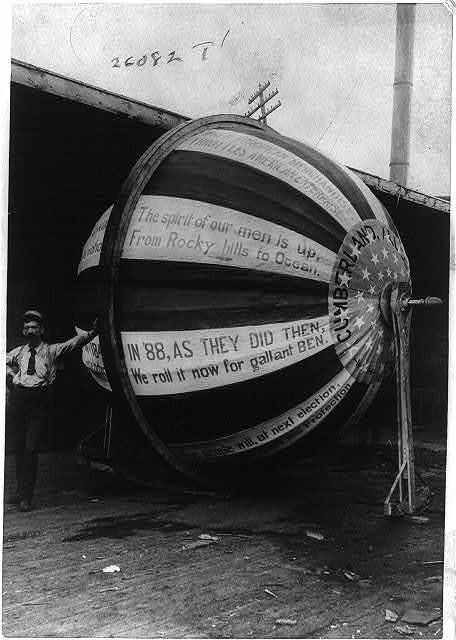There’s still time to register to vote before the November elections. Find state registration deadlines, eligibility and more.
Posts tagged "elections"
Image description: As a publicity stunt in the 1888 presidential campaign, supporters of Benjamin Harrison rolled a huge ball covered with campaign slogans halfway across the country. The ball was a replica of one built for Harrison’s grandfather, William Henry Harrison, for his 1840 presidential campaign. The gimmick gave rise to the phrase, “Keep the ball rolling.” Learn more about this historical event.
Photo from the Prints and Photographs Division, Library of Congress
If you are planning to vote absentee in this year’s federal elections, make sure you request a ballot early.
Asked by Anonymous
How can citizens recall a congress person
Citizens cannot recall a U.S. Senator or Representative because the ability to remove a member of Congress was not written into the Constitution. The Constitution describes the term length and the courts have said that no action by a state or citizen can override it.
However, there is one way for a U.S. Senator or Representative to be terminated before the end of the normal term. Other members of the House or Senate, whichever body the member of Congress belongs to, can remove a fellow member by a two-thirds vote. This process is called “expulsion” and it’s outlined in the Constitution.
To learn more about how to remove a member of Congress, download this report from the Congressional Research Service (PDF).
Asked by Anonymous
Who is in charge of the qualifying of candidates for the various parties to become president of the United States and who is responsible for making sure that candidate is a valid "naturally born" United States citizen?
The Constitution lists only three qualifications for Presidential candidates: the person must be at least 35 years of age, be a natural born citizen, and must have lived in the United States for at least 14 years.
The guidelines that candidates must follow in order to qualify for elections differ from state to state, according to a Congressional Research Service report (PDF). Generally, candidates for President must file a statement of candidacy with the secretary of the state or the state’s party chair. In some states, the Secretary of State may automatically certify candidate names for the ballot by other methods. Presidential candidates may also be required to pay a filing fee, submit petitions, gather signatures, or perform all of these actions.

